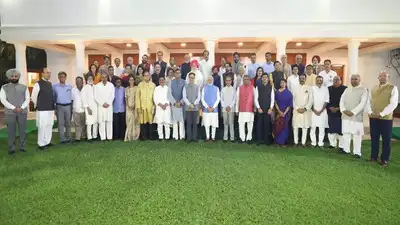PM Modi meet all party delegation, says they “Put Indian’s voice forward”….
Prime Minister Narendra Modi on Tuesday met members of the seven multi-party delegations that
recently travelled to over 30 countries to highlight India’s strong stance against terrorism following Operation Sindoor.
The meeting took place at the Prime Minister’s residence at 7, Lok Kalyan Marg in Delhi.
Delegation members, including MPs from across party lines, former parliamentarians and senior
diplomats, shared their experiences of engaging with foreign leaders and representatives during
their outreach.
The visit was aimed at projecting national unity and ensuring the global community hears one voice
from India on terrorism,” said a government official earlier. The outreach is part of a larger effort to
counter Pakistan’s attempts to internationalise the Kashmir issue while downplaying cross-border
terrorism.
Over 50 individuals were part of the outreach mission, including current and former MPs and ex
diplomats. Among the leaders who headed the delegations were BJP’s Ravi Shankar Prasad and
Baijayant Panda, Congress MP Shashi Tharoor, JD(U)’s Sanjay Jha, Shiv Sena’s Shrikant Shinde, DMK’s Kanimozhi, and NCP(SP)’s Supriya Sule. The presence of leaders from the opposition as well as the ruling alliance lent the initiative a bipartisan character.
The External Affairs Ministry had earlier appreciated the teams for representing India’s stance
effectively in international forums. Foreign Minister S Jaishankar also held a separate interaction
with the delegates last week, praising their role in building global awareness about the threat of
terrorism emanating from Pakistan.
Each delegation had a specific regional focus from the US and Europe to the Middle East, Africa,
and Southeast Asia. Discussions ranged from counterterrorism cooperation to strategic partnerships,
with the Indian teams also addressing concerns related to misinformation and propaganda.
The government’s decision to send inclusive delegations, featuring MPs like Asaduddin Owaisi
(AIMIM), Manish Tewari (Congress), and Prem Chand Gupta (RJD), was widely seen as an attempt
to present a unified front on an issue of national importance.
“India against terrorism”
India has been raising its voice against terrorism since the very beginning, which is basically
mentioned in the Indian Constitution as “India shall be a supporter of peace at the international
level”.
India has taken a multi-pronged approach to combat terrorism both nationally and internationally.
NATIONAL STEPS AGAINST TERRORISM :
1. Legal and Policy Measures
Unlawful Activities (Prevention) Act (UAPA): Strengthened to allow for individual terrorists to be
designated, not just organizations.
National Investigation Agency (NIA): Established in 2008 after the 26/11 Mumbai attacks to
investigate and prosecute offenses related to terrorism.
National Intelligence Grid (NATGRID): Aimed at improving information sharing among various
security and intelligence agencies.
2. Institutional and Structural Initiatives
Multi-Agency Centre (MAC): Coordinates real-time intelligence sharing among central and state
agencies.
National Security Guard (NSG): Elite counter-terrorism unit used in major incidents like 26/11.
State Counter-Terror Units: Specialized units in states like Maharashtra’s ATS (Anti-Terrorism
Squad) for regional coordination.
3. Technological and Surveillance Enhancements
Use of drones, satellite imaging, and cyber monitoring to track terror activities.
Cybersecurity frameworks to tackle online radicalization and digital propaganda.
4. Border and Internal Security
Fence and surveillance along the India-Pakistan and India-Bangladesh borders.
Strengthening paramilitary forces like BSF, CRPF, and Assam Rifles in conflict-prone areas.
Rehabilitation programs for surrendered militants in Jammu & Kashmir and Northeast.
5. Community Engagement & Deradicalization
Programs in states like Kerala, Maharashtra, and Jammu & Kashmir for youth engagement,
education, and counter-radicalization.
INTERNATIONAL STEPS AGAINST TERRORISM
1. Diplomatic Engagement
Raising cross-border terrorism at global forums like the UN, BRICS, G20, and SCO.
Pressuring Pakistan on terrorism through Financial Action Task Force (FATF) and diplomatic
channels.
2. International Cooperation
Extradition treaties and mutual legal assistance treaties (MLATs) with several countries.
Participation in joint counter-terror exercises with countries like the USA, France, Russia, and
Israel.
3. Intelligence Sharing
Bilateral arrangements for intelligence cooperation with countries like the USA (Homeland Security
dialogue), UK, Australia, and others.
Member of Interpol, ASEAN Regional Forum, and other multilateral platforms for anti-terror
coordination.
4. Support for UN-led Initiatives
India supports the UN Comprehensive Convention on International Terrorism (CCIT), proposed by
India in 1996 but yet to be adopted.
Backing efforts to blacklist terrorist organizations and individuals at the UN (e.g., Masood Azhar).
Recent steps taken by India (2020s)
Balakot airstrike (2019) in response to Pulwama terror attack, showing a shift towards pre-emptive
action.
Revocation of Article 370 (2019) aimed at better integration and control in Jammu & Kashmir.
Operation sindoor (2025) in response to pahalgam terror attack.
Busting terror funding networks and banning groups like PFI under UAPA etc.
Also Read:- Brics Summit

